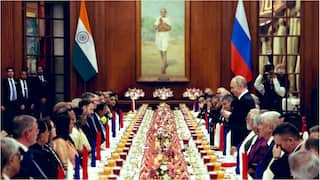Indian Exports To Receive Limited Benefit From FTA With UK: GTRI
In 2022-23, India shipped exports to the UK worth $11.41 billion, and out of this figure, $6 billion worth of goods like petroleum products, and airplanes, among others entered the UK at zero duty.

India’s high-quality labour-intensive goods would be at an advantage from the removal of import duties by the UK, as per the proposed free trade agreement between the two countries, think tank GTRI said. India’s goods like apparel, footwear, carpets, and cars will benefit from the exclusion of import duty, the think tank stated.
However, the Global Trade Research Initiative (GTRI) said that these gains will be limited as the majority of the Indian goods are already reaching the UK at low or zero tariffs, reported PTI. Notably, in 2022-23, India shipped merchandise exports to the UK worth $11.41 billion, and out of this figure, $6 billion worth of goods like petroleum products, medicine, machine parts, and airplanes, among others entered the UK at zero duty, the research body stated.
The FTA, as a result, is projected to have little impact on boosting exports as more than half of Indian products already have access to the UK at low or zero tariffs. GTRI co-founder, Ajay Srivastava said, that the average duty on goods imported from India into the UK is 4.2 per cent. However, Indian exports worth $5 billion would gain from decreasing duties and these goods include textiles, apparel, footwear, carpets, cars, marine products, grapes, and mangoes. These goods typically are subjected to low to moderate tariffs in the UK, Srivastava added.
GTRI further noted that duties on yarn and fabric, for instance, are 4 per cent, while shirts, trousers, women’s dressers, and bed linen attract tariffs from 10 to 12 per cent. Handbags and trunk cases are charged at 8 per cent, while the tariff on footwear ranges from 4 to 6 per cent. These products would be positively impacted by the reduction in export duties under the proposed FTA.
Currently, negotiations between the two countries are ongoing, as representatives of the two sides engage in talks in New Delhi, which are expected to conclude by the month's end. GTRI added that to help Indian exports grow, major improvements in product quality are needed as signing a FTA might not suffice. For instance, India’s exports to Japan increased from $257.7 million to $368.6 million during 2007-09 to 2019-21 period, indicating a combined growth of 43.1 per cent, whereas India’s global exports increased by 67.9 per cent during the same period. So the GTRI stated that the moderate increase in Indian exports to Japan could be attributed to natural growth factors rather than the FTA. Further, the trade agreement would immediately benefit UK exporters after India removes high tariffs on British goods as part of the FTA, the GTRI noted.
India’s merchandise imports from the UK stood at $8.96 billion in 2022-23, out of which about 91 per cent of the total imports entered India after paying average to high tariff duties. For instance, tariff on cars stood at 100 per cent, while Scotch whisky and wines were taxed at 150 per cent. The simple average tariff in India on products imported from the UK is 14.6 per cent, the report said.
The global research body stated that the UK’s products such as precious metals, like silver, gold, and diamonds, metal scrap, petroleum products, scotch, machinery, medicine, and others would benefit from the FTA. During 2022-23, the UK exported precious metals worth $2.7 billion, and scotch and other alcohol worth $374 million. With regards to luxury cars, the UK could be looking for zero tariffs, but India might cut them from 100 per cent to 50 cent, the think tank said. India could also be looking at permitting some thousand units at a 25 per cent tariff. Such sectors in India receive high tariff protection, even more than the agricultural products, the GTRI noted.
Regarding the Rules of Origin, a crucial issue in the agreement, the GTRI stated that India would prefer more conservative rules in comparison to the majority of the developed countries, resulting in extended discussions and negotiations in the FTA talks. However, the research body noted that India might need to be less rigid in it’s Rules of Origin framework, particularly as it’s companies in sectors like chemicals, electronics, and synthetic textiles, have increasingly started using imported inputs. The Rules of Origin make sure that the goods from third countries don’t get FTA benefits unless they go through major transformations in the exporting country.
Also Read : India's Wholesale Inflation Jumps To 6-Month High Of -0.26 Per Cent In September






































